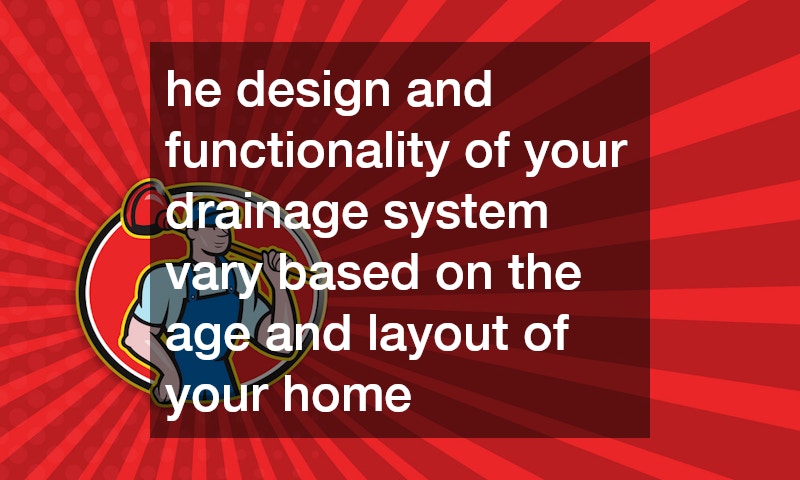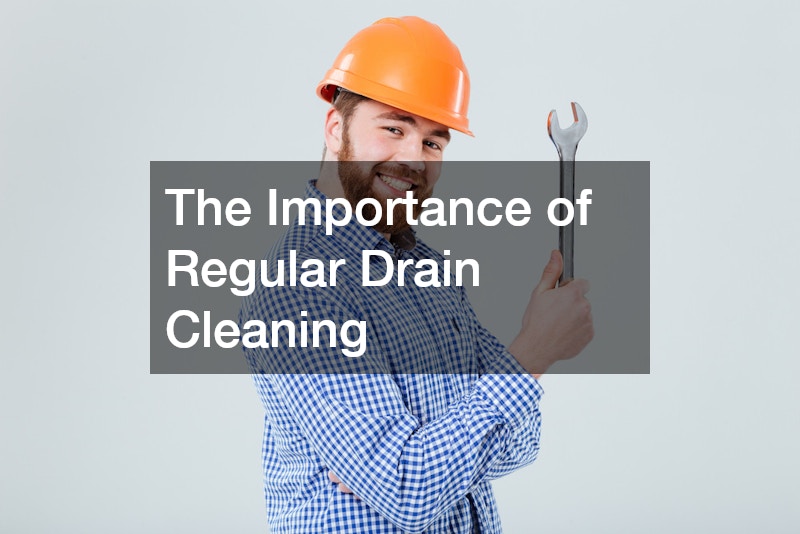Regular maintenance of your drain system is essential for the overall health of your home. Drainage systems are integral to removing wastewater from your home, ensuring a clean and functional living environment. Households often overlook the importance of these systems until an issue arises, such as a clogged drain. Regularly cleaning your drains helps prevent blockages and other plumbing issues that can lead to costly repairs or replacements. Understanding the components and functions of your drainage system can empower homeowners to take preventive measures.
Drains are part of a complex network that channels wastewater away from your home to a sewage treatment facility. This system includes various components, each serving a specific purpose from traps, vents, and pipes. Clogged drains can result from numerous causes such as hair, grease, food particles, and small objects. Understanding what can clog your drains allows you to take proactive steps to prevent blockage. Effective maintenance involves both routine professional inspections and regular cleaning to remove accumulated debris.
The design and functionality of your drainage system vary based on the age and layout of your home. Newer homes tend to have more sophisticated drainage systems that are easier to maintain. Older homes might have drains made from materials prone to corrosion and could require more frequent inspections. Regardless of your home’s design, knowing where the main drain and clean-out plugs are located can save time during maintenance or emergencies. Keeping an eye on drain efficiency and understanding common signs of obstruction can help address issues before they escalate into significant problems.
Preventive Maintenance for Clogged Drains
Preventive maintenance is a critical practice for ensuring the longevity and functionality of your drainage system. Regular clogged drain cleaning acts as a proactive measure to eliminate debris and buildup that can restrict water flow. Simple actions such as being mindful of what goes down the drain can have a significant impact. Avoid disposing of grease, coffee grounds, and large food particles in the sink. Ensuring that only wastewater and appropriately sized particles pass through the drainage system minimizes the risk of clogs.
Using drain guards and strainers over sinks and tub drains can help prevent large objects from entering the pipes. These inexpensive devices catch hair and other materials before they become problematic. Additionally, conducting routine cleaning with safe and effective methods such as baking soda and vinegar can help keep drains clear. Occasional professional cleaning is also advisable to tackle stubborn debris that everyday maintenance can miss. Employing these strategies can drastically reduce the likelihood of experiencing a clogged drain.
Consistency in maintenance is pivotal: the drains must be checked and cleaned regularly even if no immediate issues are present. Scheduling an annual inspection with a plumber ensures that any minor problems are promptly addressed. They can use tools such as cameras to inspect the inside of the pipes and spot potential vulnerabilities. Investing in routine maintenance may require time and money upfront, but it saves you from much costlier repairs or replacements down the road. Establishing a drainage maintenance routine also adds peace of mind, knowing that your system remains free-flowing and efficient.
The Economic and Environmental Impact of Clean Drains
Keeping your drains clean not only safeguards against plumbing issues but also has significant economic and environmental benefits. When drains are clogged, it can lead to water damage which involves costly repairs and potentially expensive insurance claims. Clean drains improve water flow efficiency, reducing the risk of overflow or burst pipes that could damage property. Furthermore, efficient water usage leads to lower water bills. By ensuring your drains are clear, you are taking active steps towards a more sustainable lifestyle that conserves water and reduces waste.
On an environmental level, regular drain cleaning minimizes the discharge of harmful substances into our water systems. Clogged drains can cause untreated sewage and chemicals to back up, leading to contamination of local water sources. By preventing these issues through regular maintenance, we help protect aquatic ecosystems from harmful pollutants. Additionally, thoughtful waste disposal and drain maintenance are small but impactful actions that contribute to larger conservation efforts. Protecting our environment requires awareness and responsibility at an individual level, and part of this includes diligent management of our household systems.
The global shift towards sustainable living emphasizes the significance of maintaining clean and effective plumbing systems. Promoting proper drain maintenance education can increase public awareness and encourage practices that are both economically and environmentally sound. Individually and collectively, these efforts enhance the sustainability of our communities and the planet. The investment in clean drains can ripple out, leading to broader ecological and economic advances. Ultimately, everyone benefits from a cleaner, more efficient world where resources are wisely managed and conserved.
Making regular drain maintenance a priority in your household routine can yield numerous benefits. It is an investment in your home and your overall well-being by ensuring that your plumbing system functions efficiently. With improved awareness and consistent action against potential clogs, homeowners can avoid unexpected and costly plumbing mishaps. Clogged drain cleaning should never be an afterthought but rather an essential part of home maintenance. The peace of mind that comes with a well-maintained system is invaluable.
Adopting preventive measures reduces the stress and inconvenience associated with plumbing emergencies. Clean drains contribute to a cleaner home environment without worrisome odors or unsanitary conditions. The economic advantages are significant, with potential savings in repair costs, water usage, and prolonging the lifespan of your plumbing systems. Prioritizing and practicing regular cleaning can extend beyond personal benefits to more extensive environmental conservation efforts. Each step towards efficient drain maintenance contributes to a collective move towards a more sustainable future.
The importance of clogged drain cleaning cannot be understated in the preservation of both your home and the environment. Creating a maintenance plan that integrates professional and DIY methods can help keep your drains clear and your household running smoothly. Investing in knowledge and resources to effectively manage your plumbing needs empowers you to act before issues arise. By making regular drain cleaning an integral part of your home care routine, you uphold the integrity of your property and support the continued well-being of natural resources. Remember, clean drains lead the way to a clean home and a healthier planet.











